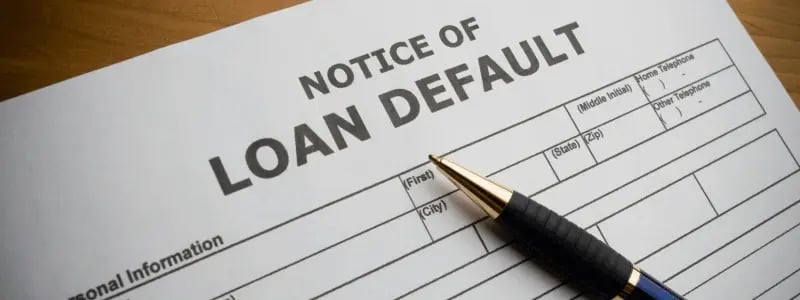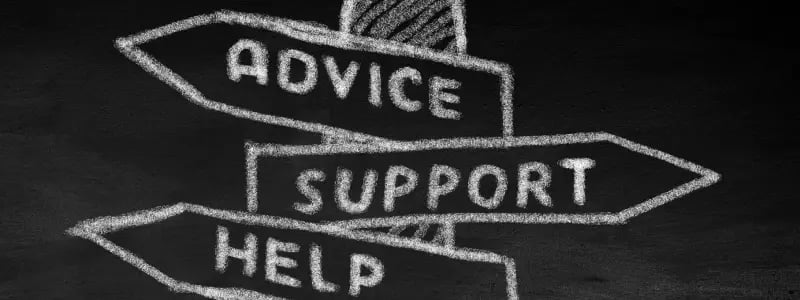What Is A Default, And What Happens If You Get One?
by Jamie Burgoyne on Jul 10, 2025 11:27:58 AM
Key Summary
A default is a formal notice that you've missed several payments and the lender is taking further action.
Defaults can happen for lots of reasons:
- Losing a job or having hours reduced.
- Illness or health problems.
- Relationship breakdown.
- Major life event like bereavement or moving home.
- Other debts piling up.
When you get a default, you'll receive a default notice. If you don't pay by the deadline, your lender can demand the full amount owed and take action to recover funds. A default will appear on your credit file for six years.
A default will hurt your credit score and future chances of finance, but it doesn't make finance impossible.
If you've got a default, speak to your lender, check if you're classed as a vulnerable customer, prioritise your debts, and think about longer-term options.
Key Definitions
| Term | Definition |
| Default |
A default is a formal record that you’ve missed multiple payments — usually 3 to 6 months — and your lender has closed the account and marked it as “in default” on your credit file. It stays on your credit report for six years. |
| Missed Payment |
A missed payment is a single payment you didn’t make on time. Repeated missed payments can lead to a default, which is more serious and has long-term credit consequences. |
| Arrears |
Arrears are the unpaid amounts you owe when you fall behind on your agreed repayments. Being in arrears for several months typically triggers a default notice. |
| Debt Collection Agency |
A debt collection agency is a company that pursues payment on behalf of a lender after an account has defaulted or been sold to them. |
| Credit File / Report |
Your credit file is a record of your borrowing history, including payments, defaults, and other financial behaviour, used by lenders to assess your ability to repay credit. |
A default on your credit file can feel scary, especially if you’re not sure what it really means or what to do next. At Marsh Finance, we speak to people in this position all the time. You're not alone, and you're not stuck.
Whether you've just received a default notice or you're worried one might be coming, this guide is here to help. We’ll break down what a default is, why it happens, what to expect if you get one, how it affects your credit score, and where to get support.
Remember a missed payment is different from a default. A missing payment may show on your file, but won’t carry the same long-term impact. A default is more serious and will stay on your credit report for six years, even if you pay it off.
👉 What happens when you get a default?
👉 How does a default affect my credit score?
👉 What should I do if I've got a default?
.webp?width=800&height=300&name=Loan%20Default%20Card%20(1).webp)
What Is A Default?
A default is a formal notice that you’ve missed multiple payments (usually 3–6 months) and your lender has closed the account and recorded the default on your credit file. It stays on your report for six years.
In simple terms, a default notice is issued after several missed payments on a credit agreement, like car finance, a credit card, or a loan, and your lender is taking further action. This is recorded by your lender with the UK credit reference agencies (Experian, Equifax, and TransUnion) in line with the Consumer Credit Act 1974. A default stays on your credit file for six years.
It usually means:
- You’ve missed payments for at least three to six months
- Your lender has tried to contact you but hasn’t been able to resolve the situation
- The lender has now decided to close the agreement and mark it as ‘in default’ on your credit file
This is different from a missed payment, which might show on your file but doesn’t carry the same long-term impact. A default is more serious and will stay on your credit report for six years, even if you pay it off.

Why Do Defaults Happen?
Defaults usually happen because someone is facing financial difficulty — such as job loss, illness, reduced income, or major life changes — and can’t keep up with repayments. They’re often linked to circumstances, not carelessness.
Life happens, and sometimes money gets tight. Defaults often happen because someone is struggling financially, perhaps due to:
- Losing a job or having hours reduced
- Illness or health problems
- A relationship breakdown
- A major life event like bereavement or moving home
- Other debts piling up
The thing to know is defaults aren’t always about carelessness. They’re often linked to tough situations… things that can happen to anyone.
That’s why it’s so important to talk to your lender as early as possible. At Marsh Finance, we understand that circumstances change, and we may be able to offer help before things reach the point of default. If you’re worried, please reach out to our team.
.webp?width=800&height=300&name=Question%20Marks%20Paper%20(1).webp)
What Happens When You Get A Default?
When you get a default, your lender issues a formal notice, closes the agreement if the arrears aren’t cleared, and records the default on your credit file for six years. They may also request full repayment or pass the debt to a collection agency.
When you fall into arrears (usually 3–6 months of missed payments), the lender is required under the FCA’s Consumer Credit Sourcebook (CONC) to contact you and outline your options.
If your account then reaches the default stage, here’s what usually happens:
- You'll receive a Default Notice
This is a formal letter called a Default Notice, issued under Section 87(1) of the Consumer Credit Act 1974, which gives you at least 14 days to take action before the default is registered. It’s sent under the Consumer Credit Act 1974 and gives you a chance to put things right.
- If you don’t pay by the deadline
The agreement will be cancelled. This means your lender can demand the full amount owed, take further action to recover the money, or pass your account to a debt collection agency.
- The default is recorded on your credit file
It will appear on your report for six years, even if you later pay it off in full. This can make it harder to get approved for new credit, including things like mortgages, credit cards, or new car finance.
Also be aware that the lender may pass debt to a debt collection agency. A debt collection agency can pursue repayment, so it’s important to resolve the issue quickly.
Legal note:
Defaults, default notices, and arrears handling are governed by the Consumer Credit Act 1974 and the Financial Conduct Authority’s Consumer Credit Sourcebook (CONC). These rules set the minimum notice periods, how lenders must communicate with you, and how your data is reported to UK credit reference agencies.
What Happens Next? A Full Default Timeline
- You miss payments
- Your lender contacts you
- You receive a default notice
- You get at least 14 days to act
- The account is closed
- The default is added to your credit file
- Debt may be passed to collectors
- Legal action becomes possible
.webp?width=800&height=300&name=Credit%20Score%20Medium%20(1).webp)
How Does A Default Affect My Credit Score?
A default can significantly lower your credit score and stay on your report for six years, making it harder to get approved for new credit and often leading to higher interest rates if you are accepted.
A default can lower your credit score significantly, especially if your report was otherwise clean.
Defaults remain on your credit report for six years in line with FCA credit reporting rules and the data-sharing standards used by UK credit reference agencies.
Here’s what can happen:
- You may be turned down for new credit or finance deals
- If you are accepted, you might be offered higher interest rates
- Employers or landlords who run credit checks might see the default
The good news? Your score can start to recover over time, especially if you take steps to manage your debts and avoid further issues.
We’ve written a full guide on what help is available if you’re struggling with car finance and it includes free advice options and links to support.
.webp?width=800&height=300&name=Stress%20Money%20(1).webp)
What Should I Do If I’ve Got A Default?
If you have a default, contact your lender quickly, check whether you’re classed as a vulnerable customer, prioritise essential debts, and seek free debt advice to create a realistic plan.
Don’t ignore it, and try not to panic. There are things you can do to move forward:
✅ Speak to your lender
If your finance is with Marsh, we may be able to help even at this stage. Depending on your situation, we might be able to agree on a repayment plan or explore other options. The FCA requires lenders to provide additional support to customers who meet the criteria under the FCA’s Guidance for the Fair Treatment of Vulnerable Customers.
✅ Check if you’re classed as a vulnerable customer
If you’re dealing with health issues, job loss, or a big life change, you might be classed as a vulnerable customer. That means extra support could be available.
✅ Prioritise your debts
Work out which debts are most important to keep up with, like rent, utilities, and priority loans. If you’re unsure, charities like StepChange, PayPlan and National Debtline can help you create a budget and a plan.
✅ Think about longer-term options
In some cases, you might want to explore a voluntary termination or voluntary surrender of your car finance agreement. These are legal ways to end your agreement early, though they come with different consequences, so it’s important to understand the difference.

How Marsh Finance Can Help
If you have a default with us, or you're worried you might get one, please don’t suffer in silence. We’re here to help, not judge. We know that behind every missed payment is a story. That’s why we take the time to listen.
We can:
- Work with you to understand your situation
- Look at repayment options that may be more affordable
- Offer support if you’re classed as a vulnerable customer
- Signpost you to helpful organisations
You can also read more about your rights if you’re in car finance difficulty.
Having a default on your credit file doesn’t mean the end of the road.
It’s a bump in the journey, one that many people experience. The most important thing is to take action early, speak to your lender, and get the support you deserve.
If you're with Marsh Finance, you're not just a number; you're a person, and we're here to help you through it.
Need support?
Visit our Customer Support Hub or speak to our team if you’re facing difficulties. The sooner you get in touch, the more we can do.
.webp?width=800&height=300&name=Car%20Question%20(1).webp)
Frequently Asked Questions About Defaults
What is a default on a credit file?
A default on a credit file means that a lender has recorded that you’ve missed multiple payments (usually 3–6 months) and have not brought your account up to date. The lender will issue a formal default notice, and if no payment is made, the account is marked as defaulted and closed. This entry stays on your credit report for six years.
What happens when you get a default?
When you get a default, your lender may:
- Cancel your credit agreement
- Request full repayment of the outstanding balance
- Pass your account to a debt collection agency
- Record the default on your credit report for six years
This can affect your ability to get new credit, including car finance, mortgages, and credit cards.
How bad is a default on your credit score?
A default can significantly lower your credit score, especially if your history is otherwise clean. The impact depends on your overall credit profile, but it often results in a drop of 100+ points. Lenders may view you as higher risk, meaning you could be declined or offered less favourable terms on future credit applications.
Can a default be removed from your credit file?
A default will stay on your credit file for six years from the date it was registered, even if you pay off the debt. It can only be removed if it was recorded in error. If you believe a default is incorrect, you can raise a dispute with the credit reference agency or the lender.
How long does a default stay on your credit report?
A default remains on your credit report for six years from the date of default, not the date you finish paying it. After six years, it drops off automatically, even if the debt was not fully repaid.
Can I still get car finance with a default?
Yes, some lenders, including non-prime and near-prime car finance providers, may still approve you for finance even if you have a default on your file. However, the interest rate may be higher, and you may need to meet other criteria. Read our guide to car finance help and your rights in 2025 for more support.
Can I avoid getting a default?
Yes. To avoid a default:
- Talk to your lender early if you’re struggling
- Try to make partial payments if full payment isn’t possible
- Set up a repayment plan or breathing space
- Review your budget and get free debt advice
- Let your lender know if you’re a vulnerable customer
Taking action early gives your lender more flexibility to help you.
Do I still have to pay if I get a default?
Yes. A default means the agreement has been closed, but you still owe the debt. The lender (or a debt collector, if the debt is sold) will likely contact you to recover the balance. Repaying the debt won’t remove the default, but your credit file will be updated to show the debt is “satisfied,” which is better than leaving it unpaid.
What’s the difference between a missed payment and a default?
A missed payment is a single payment you didn’t make on time. If the issue isn’t resolved, repeated missed payments can lead to a default, which is more serious and long-lasting. A missed payment may affect your credit file for 12 months, while a default remains for six years.
What should I do if I’ve received a default notice?
If you’ve received a default notice, don’t ignore it. You usually have 14 days to take action, pay the overdue amount or contact your lender to discuss options. At Marsh Finance, we encourage you to reach out to us straight away so we can explore ways to support you before the default is finalised.
Am I classed as a vulnerable customer if I’ve defaulted?
Not automatically, but if your financial difficulties are linked to health issues, job loss, bereavement, or life changes, you may meet the criteria. If you’re a vulnerable customer, you may be entitled to extra support from your lender. Learn more about our support for vulnerable customers.
Will a default affect getting a mortgage?
Yes, a default affects your ability to get mortgages. Mainstream lenders may decline your application, especially if the default is recent or large. However, some specialist mortgage lenders will consider applications if the default is older or has been repaid.
Can I still end my car finance early if I’ve defaulted?
If you're struggling and want to end your agreement, you may still have the option of voluntary termination (VT) or voluntary surrender (VS), depending on your finance type and how much you've repaid. These options can affect your credit differently. Read our guide to VT vs VS here.

- February 2026 (1)
- January 2026 (10)
- December 2025 (9)
- November 2025 (3)
- October 2025 (12)
- September 2025 (8)
- August 2025 (13)
- July 2025 (25)
- June 2025 (17)
- May 2025 (10)
- April 2025 (5)
- March 2025 (6)
- February 2025 (4)
- January 2025 (4)
- December 2024 (10)
- November 2024 (14)
- October 2024 (12)
- September 2024 (25)
- August 2024 (74)
- February 2024 (1)
- May 2023 (2)
- March 2023 (1)
- February 2023 (1)
- December 2022 (1)
- October 2022 (2)
- August 2022 (1)